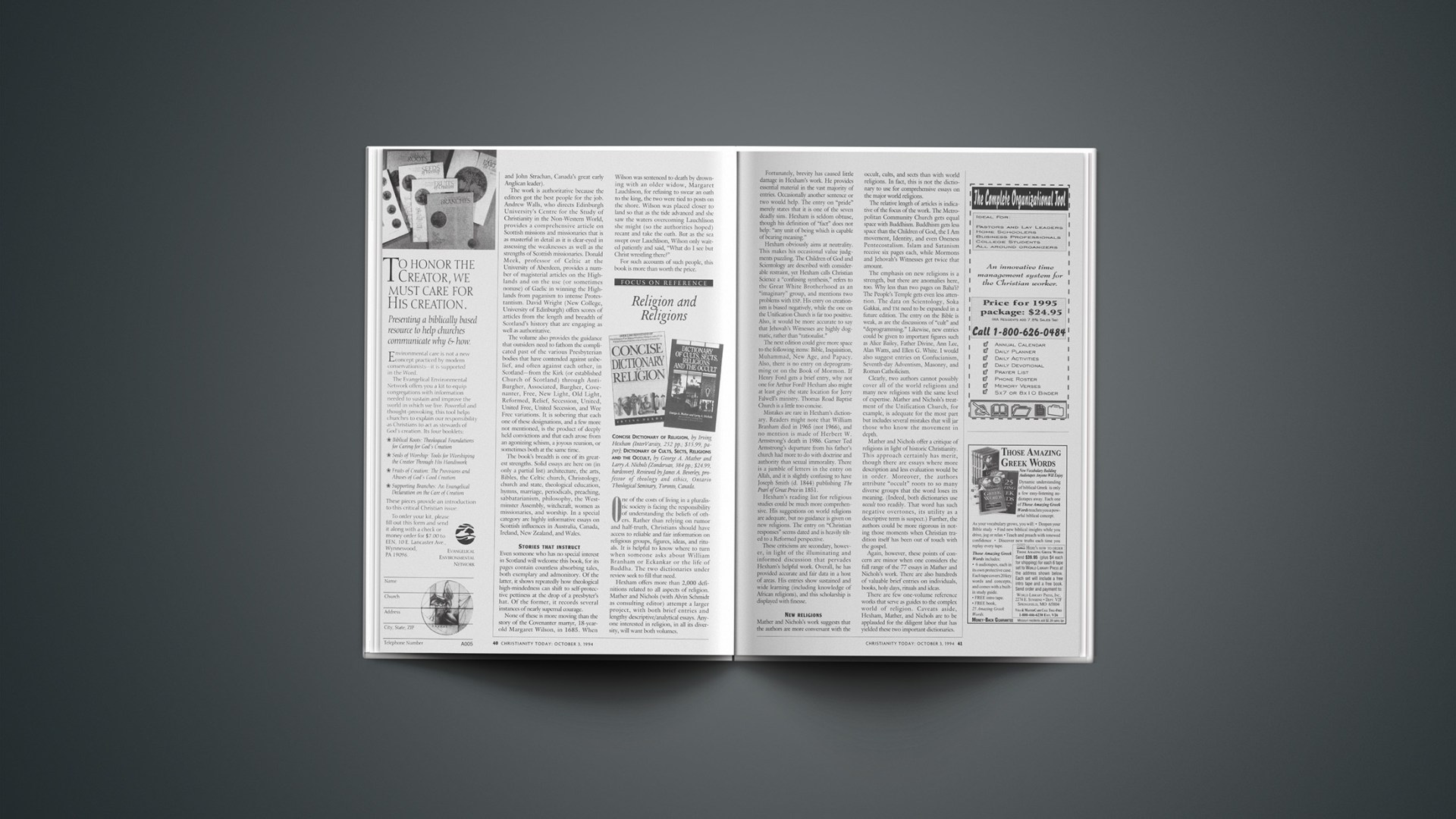FOCUS ON REFERENCE
“Concise Dictionary Of Religion,” by Irving Hexham (InterVarsity, 252 pp.; $15.99, paper); “Dictionary Of Cults, Sects, Religions And The Occult,” George A. Mather and Larry A. Nichols (Zondervan, 384 pp.; $24.99, hardcover). Reviewed by James A. Beverley, professor of theology and ethics, Ontario Theological Seminary, Toronto, Canada.
One of the costs of living in a pluralistic society is facing the responsibility of understanding the beliefs of others. Rather than relying on rumor and half-truth, Christians should have access to reliable and fair information on religious groups, figures, ideas, and rituals. It is helpful to know where to turn when someone asks about William Branham or Eckankar or the life of Buddha. The two dictionaries under review seek to fill that need.
Hexham offers more than 2,000 definitions related to all aspects of religion. Mather and Nichols (with Alvin Schmidt as consulting editor) attempt a larger project, with both brief entries and lengthy descriptive/analytical essays. Anyone interested in religion, in all its diversity, will want both volumes.
Fortunately, brevity has caused little damage in Hexham’s work. He provides essential material in the vast majority of entries. Occasionally another sentence or two would help. The entry on “pride” merely states that it is one of the seven deadly sins. Hexham is seldom obtuse, though his definition of “fact” does not help: “any unit of being which is capable of bearing meaning.”
Hexham obviously aims at neutrality. This makes his occasional value judgments puzzling. The Children of God and Scientology are described with considerable restraint, yet Hexham calls Christian Science a “confusing synthesis,” refers to the Great White Brotherhood as an “imaginary” group, and mentions two problems with ESP. His entry on creationism is biased negatively, while the one on the Unification Church is far too positive. Also, it would be more accurate to say that Jehovah’s Witnesses are highly dogmatic, rather than “rationalist.”
The next edition could give more space to the following items: Bible, Inquisition, Muhammad, New Age, and Papacy. Also, there is no entry on deprogramming or on the Book of Mormon. If Henry Ford gets a brief entry, why not one for Arthur Ford? Hexham also might at least give the state location for Jerry Falwell’s ministry. Thomas Road Baptist Church is a little too concise.
Mistakes are rare in Hexham’s dictionary. Readers might note that William Branham died in 1965 (not 1966), and no mention is made of Herbert W. Armstrong’s death in 1986. Garner Ted Armstrong’s departure from his father’s church had more to do with doctrine and authority than sexual immorality. There is a jumble of letters in the entry on Allah, and it is slightly confusing to have Joseph Smith (d. 1844) publishing “The Pearl of Great Price” in 1851.
Hexham’s reading list for religious studies could be much more comprehensive. His suggestions on world religions are adequate, but no guidance is given on new religions. The entry on “Christian responses” seems dated and is heavily tilted to a Reformed perspective.
These criticisms are secondary, however, in light of the illuminating and informed discussion that pervades Hexham’s helpful work. Overall, he has provided accurate and fair data in a host of areas. His entries show sustained and wide learning (including knowledge of African religions), and this scholarship is displayed with finesse.
NEW RELIGIONS
Mather and Nichols’s work suggests that the authors are more conversant with the occult, cults and seers than with world religions. In fact this is not the dictionary to use for comprehensive essays on the major world religion.
The relative length of articles is indication of the focus of the work. The Metropolitan Community Church gets equal space with Buddhism. Buddhism gets less space than the Children of God, the I Am movement, Identity and even Oneness Pentecostalism. Islam and Satanism receive six pages each, while Mormons and Jehovah’s Witnesses get twice that amount.
The emphasis on new religions is a strength, but there are anomalies here too. Why less than two pages on Baha’i? The People’s Temple gets even less mention. The data on Scientology, Soka Gakkai, and TM need to be expanded in a future edition. The entry on the Bible is weak, as are the discussions of “cult” and deprogramming,” likewise, new entries could be given to important figures such as Alice Bailey, Father Divine, Ann Lee, Alan Watts, and Ellen G. White. I would also suggest entries on Confucianism, Seventh-Day Adventism, Masonry, and Roman Catholicism.
Clearly, two authors cannot possibly cover all of the world religions and many new religions with the same level of expertise. Mather and Nicholas treatment of the Unification Church, for example, is adequate for the most part but includes general mistake that will jar those who know the movement in depth.
Mather and Nichols offer a critique of religions in light of historic Christianity. This approach certainly has merit, though, there are essays where more description and less evaluation would be in order. Moreover, the authors attribute “occult” roots to so many diverse groups that the word loses its meaning (Indeed, both dictionaries use occult too readily. That would has such negative overtones, its utility as a descriptive term is suspect.) Further, the authors could be more rigorous in noting those moments when Christian tradition itself has been out of touch with the gospel.
Again, however, these points of concern are minor when one considers the full range of the 77 essays in Mather and Nichols’s work. There are also hundreds of valuable brief entries on individuals, books holy days, rituals and ideas.
There are few one-volume reference works that serve as guides to the complex world of religion. Caveats aside, Hexham, Mather, and Nichols are to be applaud for the diligent labor that has yielded these two important dictionaries.
Copyright © 1994 Christianity Today. Click for reprint information.










